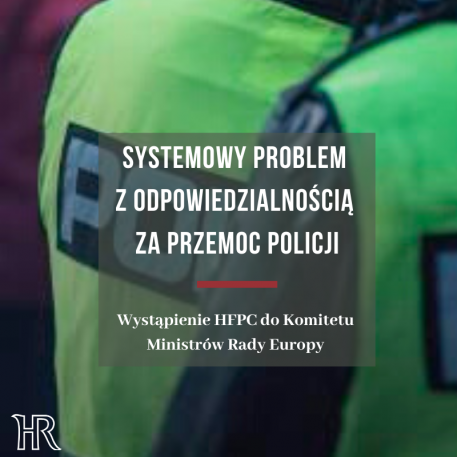
Accountability for police violence – a systemic problem. HFHR sends a communication to CoE Committee of Ministers
♦ The Helsinki Foundation for Human Rights has sent a communication to the Council of Europe’s Committee of Ministers, commenting on the case Bednarz v. Poland, which involves charges of violent behaviour made against police officers. In the Foundation’s opinion, the measures implemented by Poland to execute the judgment are insufficient.
♦ According to the HFHR, it is still difficult to launch and conduct proceedings relating to the accountability of police officers responsible for incidents of torture, inhuman or degrading treatment or punishment. International bodies also point to the same problem.
The judgment in Bednarz v. Poland
On 13 June 2019, the European Court of Human Rights delivered the judgment in the case of Bednarz v. Poland, finding a violation of the prohibition of inhuman or degrading treatment or punishment under Article 3 ECHR. The Court determined that the applicant was arrested at the night of 23 June 2013 by police officers for consuming alcohol in a public place. He claims to have been beaten by police officers during the arrest and at a police station. The resultant criminal inquiry was discontinued by a prosecutor’s decision, who resolved that the applicant had not been beaten by the police officers. The decision was later upheld by the District Court in Stalowa Wola.
The ECtHR took a different view, finding a violation of Article 3 ECHR. It has not been shown, in the Court’s view, that it was the inquiry had been carried out in a sufficiently thorough and effective manner. The Court found it particularly unsatisfactory that the prosecutor had unconditionally accepted the statements of the police officers without taking any note of the fact that they obviously had an interest in the outcome of the case and in diminishing their responsibility. The ECtHR noted that despite having been coherent and logical, which was argued by the national authorities, the officers’ statements were identically worded. Moreover, the police officers included very detailed information in their statements, such as the addresses of witnesses to the incident and their national identification numbers. The Court added that such statements, containing details not usually found in eyewitness testimony, had been uncritically accepted by the authorities. The ECtHR further noted that all the applicant’s acquaintances who had been involved in the incident clearly confirmed that the applicant had been beaten by the police officers, but their testimony was considered to be inconsistent by the prosecutor and the court. For the above reasons, the Court held that the inquiry had been superficial and lacked objectivity.
A judgment in Strasbourg is not the end!
Currently, the Committee of Ministers of the Council of Europe is analysing whether Poland has executed this judgment at the systemic level. In December 2019, the Government of Poland presented a final report in which it expressed the hope that the general measures taken would be a sufficient basis for discontinuing the Committee’s supervision of the implementation of the Bednarz judgment.
The Helsinki Foundation for Human Rights has requested that the CoE should refrain from making such a decision. It is clear from the observations of the HFHR and positions expressed by international bodies that the case is relevant and proves that additional systemic measures should be taken. Let us remind our readers that in August 2019, the UN Committee Against Torture presented a report expressing CAT concerns about the accounts of the abuse of violence by police officers, as well as the absence of convictions in the cases of police violence. The CAT findings correspond to the conclusions of the July 2018 visit of a delegation of the UN Sub-Committee against Torture (SPT) described in a report published last month. The authors of the SPT report noted a number of accounts of police violence having been directed at suspects immediately after arrest. The SPT indicated that the mistreatment was associated with excessive use of force not only during the arrest but also during police interviews. Consequently, the SPT report recommends introducing the mandatory recording of interviews in order to prevent torture and inhuman treatment and to protect police officers from false accusations. The HFHR has presented the same recommendation. At the same time, the Foundation has argued that all proceedings concerning torture and ill-treatment by police officers, as well as all cases of death in police custody, should be investigated quickly, effectively and impartially.
Case timeline:
⇒ 23 June 2013– the applicant is arrested.
⇒ 30 July 2013 – District Prosecutor’s Office in Mielec launches criminal proceedings.
⇒ 23 December 2013 – District Prosecutor’s Office in Mielec discontinues the proceedings.
⇒ 3 July 2014 – District Court in Stalowa Wola upholds the decision to discontinue the proceedings issued by the Prosecutor’s Office.
⇒ 28 November 2014 – the application is lodged with the European Court of Human Rights.
⇒ 17 March 2016 – the case is communicated to the Polish Government.
⇒ 13 June 2019 – the European Court of Human Rights makes the judgment.
⇒ 9 January 2020 – the Polish Government presents the final report.
⇒ 20 February 2020 – the HFHR submits its observations to the CoE Committee of Ministers.
Download:


04.03.2020
 Cookies EN
Cookies EN